RITA DI SANTO draws attention to a new film that features Ken Loach and Jeremy Corbyn, and their personal experience of media misrepresentation
Error message
An error occurred while searching, try again later.Acclaimed as a masterpiece when it premiered, this study of story-telling in an Irish pub more than lives up to expectations, says MARY CONWAY

 OVERWHELMINGLY GOOD: Kate Phillips (Valerie) & Brendan Gleeson (Jack) [Pic: Rich Gilligan]
OVERWHELMINGLY GOOD: Kate Phillips (Valerie) & Brendan Gleeson (Jack) [Pic: Rich Gilligan]
The Weir
Harold Pinter Theatre, London
★★★★★
EXPECTATIONS are high when you walk into the Harold Pinter Theatre to see this new production of The Weir, and with good reason. For Conor McPherson’s play has been acclaimed as a masterpiece ever since its Royal Court premiere in 1997. When you know that the production stars Brendan Gleeson and that McPherson himself directs, a glowing review seems inevitable.
The play transports us body and soul to an out-in-the-sticks pub in Co Leitrim, where publican/barman Brendan (Owen McDonnell) casually serves the same old drinks to the same old punters. As the show opens, Gleeson’s Jack is already in situ, like he’s been there forever: the soul of every Irish pub since records began. It’s as if this pub, its landlord, its rarified clientele, its fading pictures and rickety chairs have metamorphosed organically from the fields and peat bogs, from the rivers and woodlands … indeed from the weir, itself, that colours conversation and is the title of the play.
Brendan and Jack easily converse and are soon joined by Jim (Sean McGinley). This could now be any pub anywhere with banter, reminiscence and general shared reflexion punctuating the central task of drinking. Among other things, they exchange news of a pretty young woman, called Valerie, from Dublin who is renting a local house, a diversion that predictably engages this all-male coterie.
When Valerie (Kate Phillips) arrives at the pub, accompanied by local businessman Finbar (Tom Vaughan-Lawlor), the group dynamic broadens and conversation takes new, sweeping turns, the range of narrative sliding in and out of a boundless territory that encompasses both human and ineffable space. It’s a spellbinding acknowledgement of all that is and could be, told through a few simple stories by a few simple characters. And all this in a little pub so basic that when Valerie asks for a glass of wine, Brendan is momentarily flummoxed and says he’ll “see if there’s a bottle in the house.”
The production holds to all the original values; McPherson, with the help of designer Rae Smith, realising on stage the perfection that took shape in his own imagination. This is an ensemble show, where all the quirks and quiddities of the individually isolated characters add up to a continuous display of exquisite theatrical detail.
And their stories, telling of fairies and ghosts and sadnesses and loss, are all the more wondrous for their intimacy, spontaneity and barely acknowledged confessional candour. You feel you really are in a pub with real people, who draw on one another, drop sobriety, tell a tale they’ve never shared before, and open the shutters on all human life.
The cast are, without exception, first-class: Vaughan-Lawlor’s Finbar noisy and extravert, McGinley’s Jim sleepy and slow, McDonnell’s Brendan even-tempered and accepting and Phillips’ Valerie unfolding her showstopping tale with the pitch-perfect hesitancy of one who tells it for the first time.
Finally, Gleeson — sensationally commanding on stage as if he were encompassing every Irishman who ever lived — a creature hewn from the rocks.
A great production of a great play.
Runs until December 6. Box office: 03330 096-690 / 0800 912-6971, haroldpintertheatre.co.uk.










